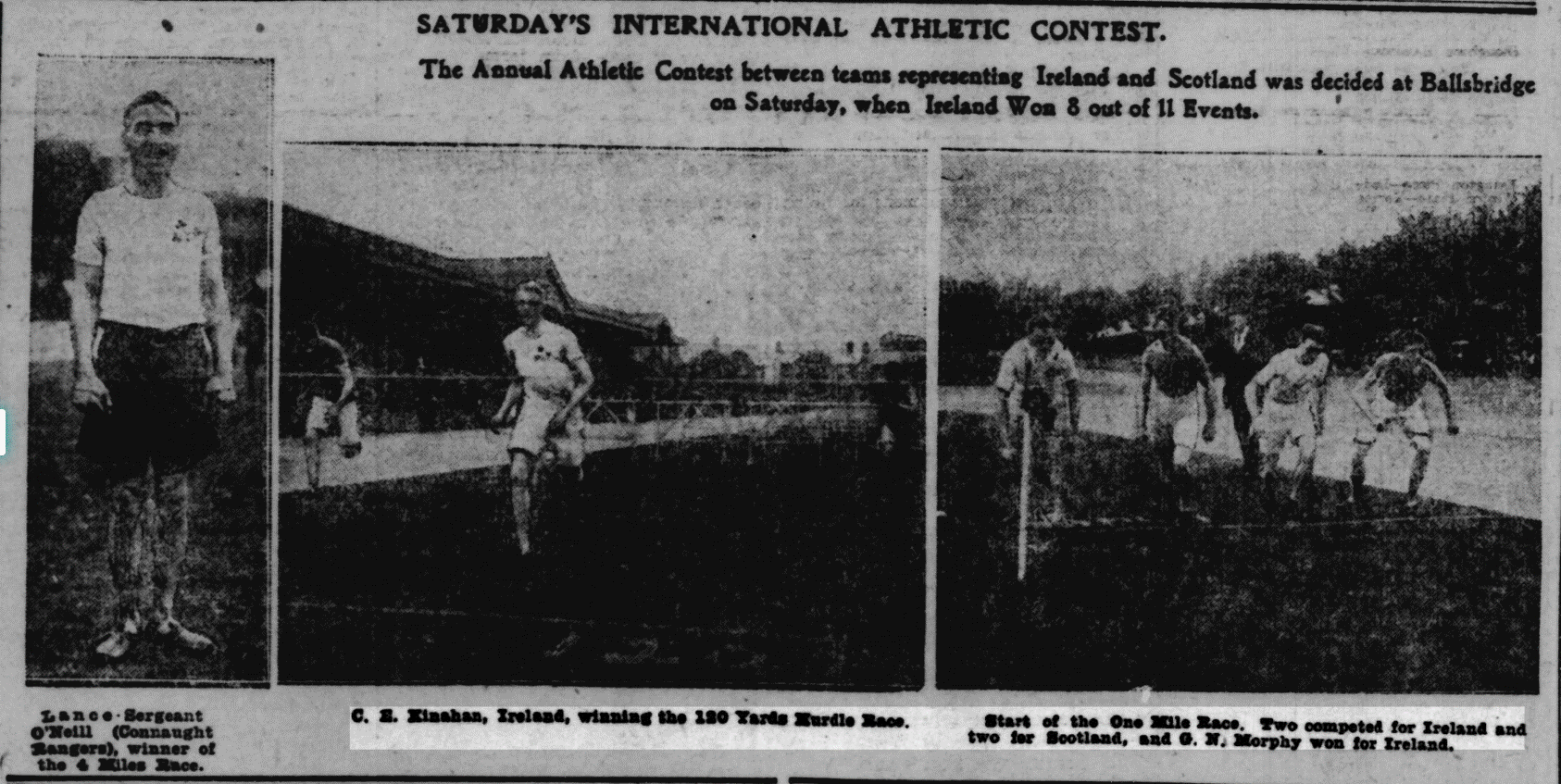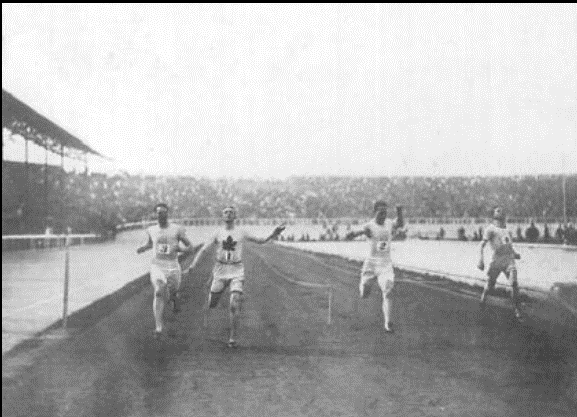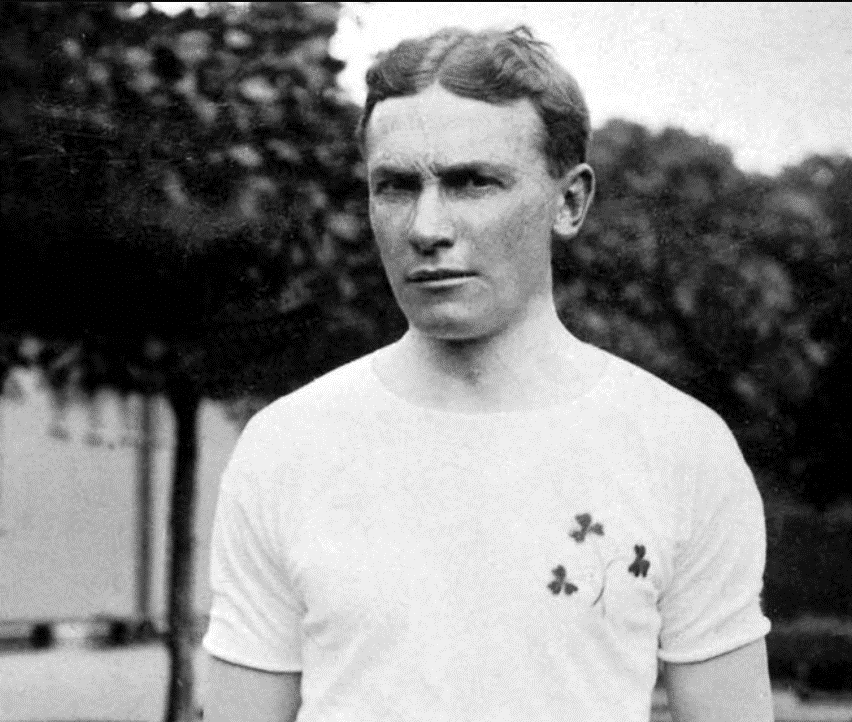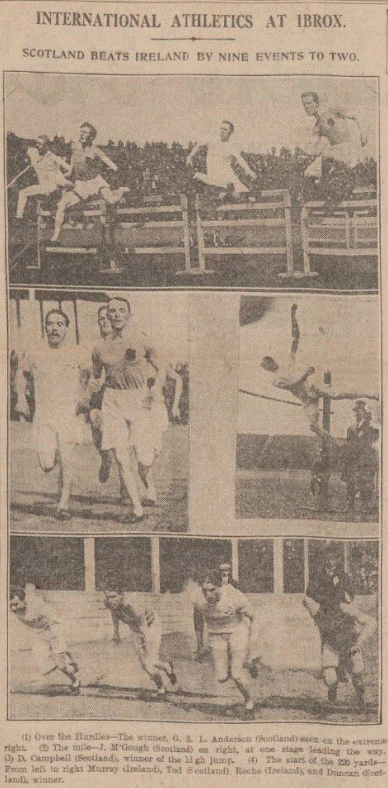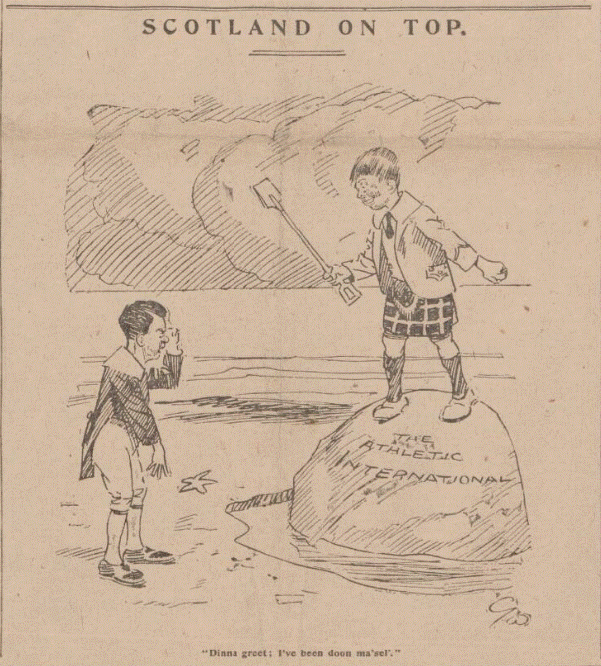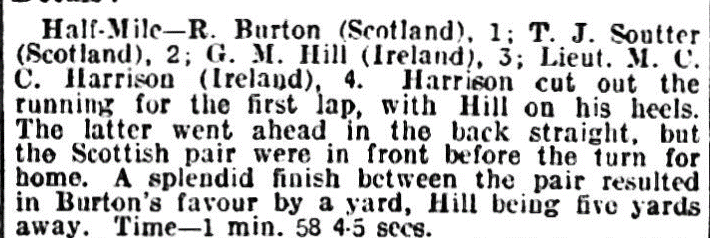In 1909 the International was held in Balls Bridge, Dublin on 17th July. Scotland had won two out of the last three matches but Ireland had won in Edinburgh in 1908 and were looking to make it two on the trot.
The report on the meeting on the following Monday in the Belfast Telegraph read as follows: “At Balls Bridge on Saturday the 17th inst., the annual contest between the representatives of Ireland and Scotland were held in delightful weather. The result was a win for the Irish athletes by 8 events to 3. The feature of the day was the running of R Kerr, the Irish Canadian sprinter who made such a prominent show at the Olympic Games. He won both the 100 and 220 yards and in the latter event created a new Irish record.”
In the 1908 Olympics, Kerr, running for Canada, had won his Heat of the 100 metres in 11.0 seconds, won his semi-final in 11.0 seconds, and finished third in the Final in 11.0 seconds – a remarkable consistency of times. In the 200 metres, he won his Heat (with JP Stark third) in 22.2 seconds, won his semi-final in 22.6 and then won the Final in 22.6 seconds. The Final was described as follows: “The final was held on 23 July 1908. The top three were within two feet of each other, as Kerr’s early lead evaporated in the straight. He was able to hang onto nine inches, however, and defeated Cloughen by that small margin.”
Another Irishman won gold at the Games when Tim Ahearne won the Triple Jump with a leap of 14.92 in the Final. Report reads: “At first Tim Ahearne set a new Olympic record with 14.72 metres. Then Garfield MacDonald improved the record to 14.76 metres and finally Ahearne took the new Olympic record with 14.92 metres.” McDonald was an American who finished second in the Final with 14.76m.
That was two Irish gold medal winners out in the Scoto-Irish match in 1909 and there were other Olympians in both teams. Kerr’s teammate George Newcomen Morphy also ran in the London Olympics but for Great Britain but was unplaced in both 800 and 1500 metres. Denis Horgan also competed for Britain in the Shot where he was second to win the silver medal.
John McGough ran for Great Britain in the 1500m in the same Olympics but was also unplaced. Tom Nicolson was an unlucky fourth in the Hammer and 12th in the Shot. It was a very high quality international that day at Balls Bridge.
Kerr winning the Olympic 200 metres final for Canada
100 yards: 1. R Kerr (I) 10.2 seconds; 2. RC Duncan (S); 220 yards: 1. R Kerr (I) 22.2 seconds; 2. RC Duncan (S)
440 yards: 1. D Dickson (S) 51.4 seconds; 2. GW Young (S); 880 yards: 1. R Burton (S) 2:00.8; 2. GN Morphy (I)
Mile: 1. GN Morphy (I) 4:33.4; 2. J McGough (S); Four Miles: 1. M O’Neil (I) 20:12.8; 1. J Murphy (I)
120 yards hurdles: 1. CE Kinahan (I) 16.8 seconds; 2. A Halligan (S)
High Jump: 1. TJ Ahearne (I) 5′ feet 8 3/4″; 2. GH Wilson (S); Broad Jump: 1. TJ Ahearne (I) 22′ 10″; 2. G Stephen (S)
Putting the Weight: 1. D Horgan (I) 44′ 6 1/2″; 2. J Barrett (I); Throwing the Hammer: 1. TR Nicolson (S) 160′ 2″; 2. D Rose (S)
IRELAND 8 EVENTS; SCOTLAND 3 EVENTS
Robert Kerr (Ireland)
1910
The competition was held on 9th July at Ibrox Park in Glasgow and on paper the Scottish team looked the stronger despite the absence of several very good athletes.
“The photographs above are from the ‘Scottish Referee’ of Monday, 11th July, and accompanied the report under the headline “IT WAS A GLORIOUS VICTORY!” which began: “The sixteenth annual athletic between Scotland and Ireland was held at Ibrox on Saturday and ended in a win for Scotland by nine events to two, This is a record score for Scotland although Ireland has equalled the performance twice – in 1888 and 1902. Brilliant weather favoured the contest and the lover climatic conditions were such as recalled the meeting of 1907, held on the same ground.” The actual results which led to the glorious event were as follows:
100 yards: PJ Roche (I) 10.4 seconds; 2. RC Duncan (S); 220 yards: 1. RC Duncan (S) 22.8 sec; 2. W Murray (I)
440 yards: 1. GRL Anderson (S) 50.8 sec; 2. R Burton (S); 880 yards: 1. R Burton (S) 1:58.8; 2. JT Soutter (S)
Mile: 1. DF McNicol (S) 4:26; 2. J Bill (I); Four Miles: 1. A McPhee (S) 20:29.4; 2. T Jack (S)
120 yards hurdles: 1. GRL Anderson (S) 16.2 seconds; 2. CE Kinahan (I)
High Jump: 1. D Campbell (S) 5′ 8 1/2″; 2. PJ Leahy; Broad Jump: 1. FG Buchanan (S) 21′ 5 3/4″; 2. WF Bennett (I)
Putting the Weight: 1. J Barrett (I) 45′ 2″; 2. WF Bennett (I); Throwing the Hammer: 1. TR Nicolson (S) 159′; 2. D Carey (I)
SCOTLAND 9 EVENTS; IRELAND 2 EVENTS
The score was emphasised in a cartoon on the front page of the paper –
In the SAAA Championships earlier that year (24th June), titles were won by RC Duncan (100 & 220), GRL Anderson (440 & hurdles), R Burton (880), A McPhee (Four Miles), FG Buchanan (Broad Jump), D Campbell (High Jump) and TR Nicolson (Shot & Hammer). Probably the strongest team that could have been turned out, and a victory maybe predicted but not by the massive score of 9-2. The Irish team also had some very good men in their team. The report in the Weekly Irish Times started
“Scotland achieved an easy victory over Ireland on Saturday, the Scotsmen winning by the convincing margin of nine points to two. Such a resulted was quite unexpected for on the performances in the championships of the respective countries the teams appeared evenly balanced; if anything a victory for Ireland was anticipated. The Irish team was strengthened by the addition of GM Hill, a King’s County man, who won the English half-mile championship; PJ Brabazon of the Clonliffe Harrierswho defeated GN Morphy in the 440 yards championship of Leinster, and PJ Roche, the ex-100 yards champion, none of whom however had figured in the Irish championships. …. It was the heaviest defeat sustained by a Hibernian team in any of the sixteen contests, and the score has only been equalled on two occasions.”
Clearly the Irish journalists went into the match with a different result in mind to the Scottish ones. How did the men named perform on the day? First, Hill in the 880 –
Then Brabazon:
And finally Roche:
All good races, maybe better from the Scottish point of view but it was interesting to note that the Irish athletes concerned had not run in the national championships.
